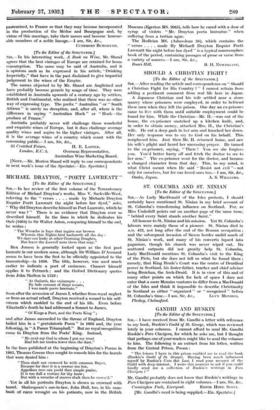MICHAEL DRAYTON, " POETT LAWREATT "
[To the Editor of the Sramwron.] Snt,—In her review of the first volume of the Tercentenary Edition of Michael Drayton's works, Miss V. Sackville-West, referring to the " verses . . . . made by Michaele Drayton Esquier Poett Lawreatt the night before hee dyed," asks, " Why did Drayton describe himself as Poet Laureate, which he never was ? " There is no evidence that Drayton ever so described himself. In the lines in which he dedicates his Ovule (1604) to Sir Walter Aston, comparing himself to the owl, he writes : "The Wreathe is Iuye that ingirts our browes Wherein this Nights-bird harboreth all the day: We dare not looko at other Crowning Boughes, But leave the Lateral unto them that may."
Ben Jonson is generally looked upon as the first poet laureate in our modem sense, although Sir William D'Avenant seems to have been the first to be officially appointed to the laureateship—in 1638. The title, however, was used much earlier to indicate a poet of eminence. Chaueei himself applies it to Petrarch ; and the Oxford Dictionary quotes from John Skelton in 1529 : " At Goforth, the vniuorsyto . . . By hole consent of theyr senate, I was made peek, laureate."
Soon after the accession of James I, whether from royal neglect or from an actual rebuff, Drayton received a wound to his self- esteem which rankled' to the end- of his life. Even before Elizabeth's death he had addressed a Sonnet to James,
" Of Kings a Poet, and the Poets King" ;
and after James succeeded to the throne of England, Drayton hefted him in a " gratulatorie Poem " in 1608 and,. the year following, in "A Paean Triumphall." But no royal recognition came to Di-ayton from the Poets' King. Instead,
" He next my God in whom I put my trust Had left ire troden lower then the duet."
In the lines published at the beginning of Drayton's Poems in 1605, Thomas Greene thus sought to console him for the laurels that were denied him :
" Thou shalt not crowned be with common Bayes,
Because for thee it is a crown too low, Appolloes tree can yeeld thee simple praise,
It is too dull a vesture for thy brow;
But with a wreathe of starres shalt thou be crowed."
."•Yet in all his portraits Drayton is shown as crowned with laurel: Shakespeare's son-in-law, John Hall, too, in his case- book of cures wrought on his patients, now in the British
Museum (Egerton M.S. 206.9,- tells how he cured with a dose of
syrup of violets " Drayton poeta laureatus " when suffering from a tertian ague.
The Bodleian MS. (Aslunolean 38), which contains the " verses . . . . made By Miehaell Drayton Esquier Poett Lawreatt the night before hee dyed." is a typical commonplace book of the period, containing passages of prose or verse from
a variety of sources.—I am, Sir, lee., '


































 Previous page
Previous page